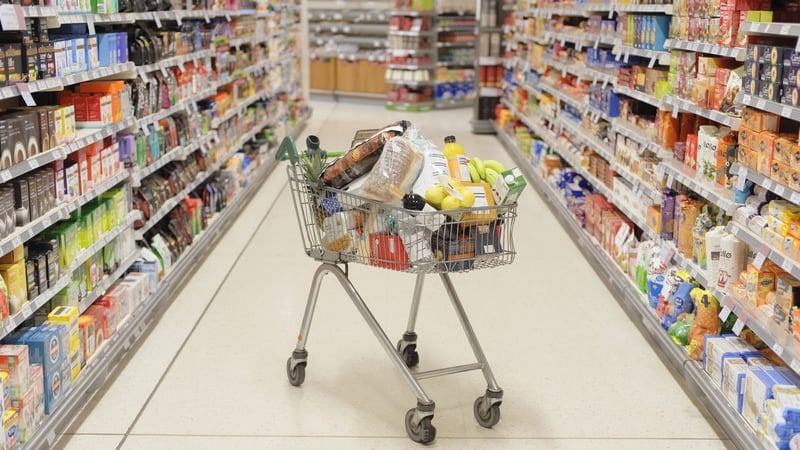There have been more than 103,000 calls for help to St Vincent de Paul this year and almost half were requests for help with food.
A further 14% were appeals for help with food as well as another issue.
Food prices have increased by 24% in the last five years, according to the Central Statistics Office.
“It’s terrible,” says one man shopping in Dublin. “My wife complains I’m spending all our money. I shop every day and every time I go to shop it’s gone up. It’s gone up.”
Other shoppers in the city say they have noticed prices rising, particularly with certain items.
“Toilet roll, that’s gone up. Butter’s gone up. Everything,” one young mother said.
“Yeah, it’s gone up now. Even with the vouchers. It’s just mad money.
“I think bread is gone up loads. Eggs is mad money as well and the baby food is expensive – not her formula – but more so just like the little packs and jars.”
“Bread’s gone up,” says another man.
“Brown bread’s gone up a lot – it’s huge. They still have the usual carrots and special offers but you don’t want to be eating carrots every day.”

CSO Statistician Anthony Dawson, who is responsible for the Consumer Price Index, said that overall the price of food and non-alcoholic beverages was up 4% in the last year.
In the last five years, he said that food prices have increased by 24%.
Mr Dawson added that certain items have increased notably in the past year.
“Beef prices, they’re up 20% compared to May 2024 … and the price of milk is up 18% while butter is up 12% in that same time period. Something else we’ve seen is the price of chocolate is up 17% compared to this time last year.”
Mr Dawson says these are increases on top of already pretty substantial rises over the last five years.
“Butter and milk they’re both up 46%. Bread is up 26%, and we’ve seen potatoes increase by 17%.”
Coffee and tea prices are up 25% and 17% respectively, he added.
Mr Dawson says that Ireland has already experienced record high inflation in 2022 and while it subsided in 2023, it was still high.
“Again we’re seeing that, come 2024/2025, still the prices continuing to increase.”
The total calls for help received by the St Vincent de Paul this year is 103,113.
Of that number, 50,471 cited food (49%) while 14,655 (14%) cited food and another issue.
The organisation tracks the cost of a basket of goods and services considered necessary to live at a socially acceptable minimum standard of living.

Vincentian MESL (Minimum Essential Standard of Living) Research Centre Manager Robert Thornton said that it has noticed a change in how people shop since its previous research in 2020.
“Five years ago, when we last talked to members of the public about this, they had agreed that you do most of your grocery shopping in one of the more discount retailers.
“This time round, surprisingly, they actually came to agree that really all the supermarkets, with the range of special offers available, with some supermarkets offering vouchers or discounts with loyalty card schemes, that really they are much of a muchness in the end.”
As prices rise, Mr Thornton said some people are feeling the pinch more.
“As costs have gone up by in and around 20% for food and approximately 19% overall, if we look at households reliant on social welfare, ultimately, we find that social welfare rates haven’t really kept pace with the change in minimum living costs.”
He said the various one-off top-up supports, some of which were targeted, and some like the electricity credits which were provided to everyone, helped offset some of the spike and things have improved compared to 2023 when living costs were at their highest.
“But nevertheless … we’re really only now at approximately where we were in 2020 despite social welfare rates being in euro terms much higher now than they were then.”

Mr Thornton said the proportion of living costs now is no more significant than it was five years ago.
Lone parent households and those with a second-level child or a teenager tend to be in deep income inadequacy, he said, where social welfare meets less than 90% of their minimum needs.
“Our minimum basket is describing what people agree you should be able to have … and they’re going to have to do without at least some of that because their income just doesn’t go far enough.”
Minister acknowledges rising food prices
Minister of State Alan Dillon – who has responsibility for retail – said that he understands that families across Ireland are feeling the pinch.
“Families have seen their weekly shop get more expensive and that’s very tough,” he said.
Speaking on RTÉ News at One, he added that the main drivers are global and that supply chain disruptions increase input costs.
We need your consent to load this rte-player contentWe use rte-player to manage extra content that can set cookies on your device and collect data about your activity. Please review their details and accept them to load the content.Manage Preferences
The minister said while inflation has eased in some areas, food prices remain high.
He said he has taken two steps to look at the issue which he hopes will protect consumers and also keep the market fair and competitive.
“I’ve met with the Competition and Consumer Protection Commission and I’ve formally requested they update their high level analysis of the grocery retail sector to get a better understanding of where grocery pressures are and price pressures are – and crucially who is profiting,” he said.
“I’ve also written to the Minister for Agriculture Martin Hayden asking that the agri-food regulator would examine the current price trends but also the market dynamics across the supply chain from the farmer to the shelf.”
“I think what we need now is clear evidence to take the appropriate action and that process is now underway,” he added.
In a statement, the Department of Enterprise highlights analysis by the Competition and Consumer Protection Commission (CCPC) in June 2023 that found no evidence of excessive pricing in the grocery retail market.
The department said it has continued to review grocery price inflation in Ireland and that it remains broadly in line with the European average.
Minister Dillon has requested the CCPC provides an update to the 2023 analysis, the statement added.




